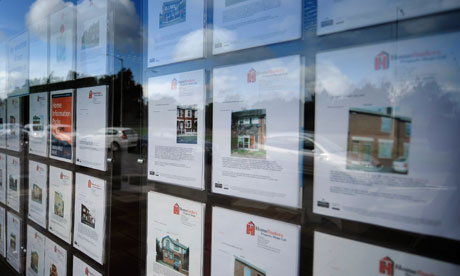Budget 2013: Osborne offers homebuyers Help to Buy
Help to Buy scheme offers buyers with a 5% deposit an interest-free loan of up to 20% of the value of most new homes

Homebuyers can borrow up to 20% of most new-build properties, interest-free, for five years. Photograph: Christopher Thomond for the Guardian
A £3.5bn investment in government loans to financially stretched homebuyers and a £12bn scheme to increase the availability of mortgages to people who cannot afford a large deposit were unveiled by the chancellor "to support a new generation in realising the dream of home ownership".
The two measures were the centrepiece of a package of financial support for the housing market, and aim to provide assistance to
first-time buyers and those "trapped" in their existing homes and unable to take the next step up the
property ladder.
In his
budget speech,
George Osborne launched Help to Buy, which is, in effect, an expansion of two existing initiatives. Under the loans scheme, a buyer hoping to purchase a newly built home will be able to take out a mortgage for just 75% of the cost of the property, provided they can stump up a 5% deposit.
Those who qualify will be eligible for an "equity loan" worth up to 20% of the value of the property, funded by the government, which will be interest-free for the first five years.
This £3.5bn scheme will run for three years from 1 April and help up to 74,000 buyers, as well as providing a boost to the construction sector, said the Treasury. These figures suggest the government loan will on average be worth just over £47,000, and assume a typical buyer will be putting down a deposit of about £11,800.
The loans scheme is an expansion of an existing scheme called First Buy, which went live in 2011, but the new version is open to those looking to move up the housing ladder, as well as first-time buyers. It also has fewer restrictions than First Buy; the maximum property price that will be considered is £600,000 and there is no cap on the maximum amount someone can earn to be eligible.
However, buyers need to be aware that after the first five years, an annual fee of 1.75% will be levied on the government loan, and this fee will then rise annually by retail prices index (RPI) inflation plus 1% after that. The government says the equity loan can be repaid at any time, or on the sale of the property.
Buyers will be able to access the scheme via participating housebuilders – likely to include most or all of the major names – and "Home Buy agents", those appointed by the government to provide a point of contact for those wishing to access affordable home ownership.
The other part of Help to Buy involves the introduction of a new "mortgage guarantee" to enable more people to obtain a home loan without the need for a prohibitively large deposit. The government will make available £12bn of guarantees to lenders, which it said should be enough to support £130bn of high "loan-to-value" (LTV) mortgages. That could translate into around 300,000 mortgages over three years, according to one expert.
The LTV is the maximum the mortgage company will lend someone who wants a particular home loan, expressed as a percentage of the value of the property, and the problem has been that most of the lowest interest rates are on mortgages of no more than 60% of the value of the property, with only a smattering of more expensive deals around for people who want to borrow 90% or 95%.
This scheme will run for three years from January 2014 and see the government give lenders who offer mortgages to people with a deposit of between 5% and 20% the chance to buy a guarantee on the high LTV portion of the mortgage. That means if a borrower's property were repossessed, the government would cover a chunk of the losses suffered by the lender.
This scheme is available to home movers as well as first-time-buyers, and on both newbuild homes and existing properties worth up to £600,000. Buyers will still need to put down a deposit of 5%.
However, it remains to be seen how much lenders will have to pay for the guarantees – and how competitive the mortgage deals will be when they become available in January. The Council of Mortgage Lenders warned that if the cost was too high, this could make the scheme uneconomical.
Hugh Wade-Jones at the mortgage broker Enness Private Clients welcomed the guarantee scheme. "The UK has been one of the few countries with a developed property market where lending is not controlled or underpinned in some way by the government.
"By effectively underwriting loans, the government is putting its money where its mouth is by easing the risk for banks providing higher loan to values to customers. This will have a particular impact on helping first-time buyers, which is the foundation of the entire market."
Case study: the builder
For Mark Suggitt, the owner of a small housebuilding firm on the south coast, the unexpected boost to the property market unveiled in Wednesday's budget represented a much needed fillip for one of the industries that has been hit hardest by the credit crunch and its aftermath.
The 49-year-old had hoped for more government assistance for those trying to get a foot on the property ladder, and welcomed yesterday's measures for homebuyers. The multibillion-pound Help-to-Buy scheme includes a mortgage guarantee incentivising lenders to offer home loans to people with small deposits, and a £3.5bn investment in interest-free loans to buyers.
Suggitt was upbeat about the guarantee scheme, which he said would help people move up the housing chain. However, he was disappointed that the loans scheme was only for new-build homes. "It's a shame it's just on new properties and not good-quality housing in general," he said. He added: "Big developers will tend to offer selected new homes for this scheme. First-time buyers should use the scheme to buy the best-value-for-money properties on the market."
Suggitt described conditions in the housebuilding business as "challenging" and said that since the recession began, his firm, based in Hastings, East Sussex, had been concentrating on building larger, "top-end" properties. These typically go on the market for between £800,000 and £1m.
The father-of-three acknowledges that this sort of price tag will be out of reach for many local people, but says there are people moving from London whose housebuying budget in the capital would buy them a house on the south coast double the size of a London purchase.
His firm, N L Suggitt & Sons, typically builds two to three properties a year, and usually has up to 12 people on site.
Suggitt was pleased to see measures to help small businesses, including the employment allowance, which takes the first £2,000 off the employer national insurance bill of every company in the country. Around 450,000 small businesses – one third of all employers – will pay no employer national insurance at all once the employment allowance is introduced in April next year.
HADGKISS
HUGHES AND BEALE
SOLICITORS
83 ALCESTER ROAD, MOSELEY,
BIRMINGHAM B13 8EB
TELEPHONE: 0121 449 5050






.jpg)
